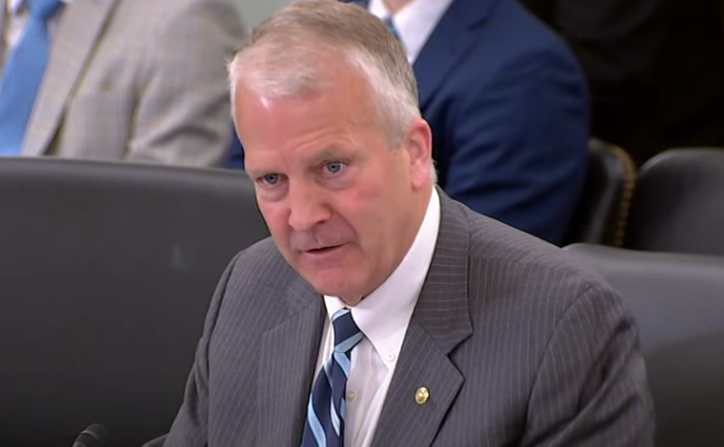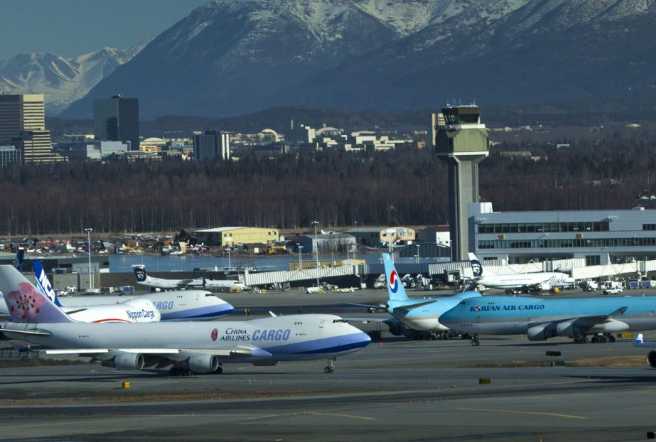WASHINGTON—U.S. Senator Dan Sullivan (R-Alaska), a member of the Senate Aviation Safety, Operations, and Innovation Subcommittee, recently secured numerous amendments to the Federal Aviation Administration (FAA) Reauthorization Act of 2024. The legislation, advanced by the full Senate Commerce Committee, reauthorizes the FAA through 2028 and now proceeds to the Senate floor for consideration.
“Aviation is as essential to countless Alaska communities as roads and bridges are to most Lower 48 communities—it’s the only way in or out, both for residents and for basic goods and services,” said Sen. Sullivan. “This stark reality makes the periodic FAA reauthorization such an important piece of legislation to my constituents. My team and I worked closely with Alaska’s general, commercial and cargo aviation sectors to craft provisions that will improve safety in Alaska, sustain the vital Essential Air Service program, provide flexibility from one-size-fits-all regulations that just don’t work for our state, and invest robustly in all aspects of our aviation infrastructure. Our amendments also focus on strengthening America’s strained aviation workforce pipeline, removing barriers for individuals interested in becoming pilots, air traffic controllers, mechanics, technicians, or related aviation professionals—especially our retiring military members who offer a wealth of skills and experience. I’ll be working with my colleagues to get this important bill through the full Senate and to the President’s desk.”
“The Alaska Air Carriers Association is profoundly grateful and appreciative of Senator Sullivan’s work passing the FAA Reauthorization Act of 2023 through the U.S. Senate Committee on Commerce, Science, and Transportation,” said Will Day and Daniel Knesek, executive director and board president of the Alaska Air Carriers Association. “Senator Sullivan’s unwavering attention to Alaska’s nuanced transportation needs is commendable, and we are proud to stand behind you as you fight for the needs of our state. Our association strives daily to ensure our contiguous policymakers understand the unique importance of reliable and safe air transportation in Alaska. Senator Sullivan’s leadership in pushing to include critical investments in our aviation infrastructure in the FAA Reauthorization will help ensure our state remains connected to the rest of the country and the world well into the future. Our industry, especially our remote communities, relies heavily on the advocacy work Senator Sullivan champions.”
“Senator Sullivan continues to be a champion for Alaska aviation,” said Adam White, director of government affairs for the Alaska Airmen’s Association. “Without a robust and modern aviation system, Alaska would grind to a halt. This long-term reauthorization of the FAA will ensure that aviation safety and modernization in Alaska will continue to improve. This improvement directly equates to a better quality of life and more reliable access to critical services for all Alaskans.”
“Due to Senator Sullivan and his staff’s hard work, programs to improve aviation safety in Alaska are front and center in this bill,” said Dr. Catherine F. Cahill, director of the Alaska Center for Unmanned Aircraft Systems Integration (ACUASI) at the University of Alaska Fairbanks (UAF). “These programs include the FAA Alaska Aviation Safety Initiative to ‘improve aviation safety, service, and infrastructure,’ programs to improve weather information for Alaskan pilots, the continuation of the FAA’s University of Alaska Unmanned Aircraft Systems Test Site, and research authorizations to improve the security of airports from drone incursions.”
Some of the major provisions championed by Sen. Sullivan in the FAA reauthorization include:
Essential Air Service:
- The bill strengthens the Essential Air Service (EAS) program and triples its funding to ensure small and rural communities remain connected to the national airspace system. The EAS program benefits approximately 60 communities in Alaska.
Alaska Aviation Safety Initiative
- The bill continues the FAA Alaska Aviation Safety Initiative (FAASI), an effort by the FAA to identify safety improvements and investments needed for the Alaska region. The legislation also requires an accompanying audit by the U.S. Government Accountability Office (GAO) to determine the effectiveness of the initiative in improving service and infrastructure in Alaska. The FAASI is an FAA effort to respond to the issues raised in the October 2020 Alaska Aviation Safety Summit and the February 2020 National Transportation Safety Board (NTSB) report calling for the FAA to take a more comprehensive approach to improving aviation safety in Alaska.
Critical Infrastructure Improvements:
- The bill ensures federal funding is able to be used to maintain critical runway length for runway resurfacing, rehabilitation or reconstruction projects to provide for critical community needs, such as projects in rural communities and villages off the road system, or economic development projects to expand a runway to meet new demands.
- Building upon Sen. Sullivan’s provisions in the 2018 reauthorization that are leading to additional ground-based ADS-B transmitters, the legislation accelerates the deployment of ground-based equipment by removing administrative barriers associated with cost benefit analyses.
- The bill provides for the safe development and deployment of Visual Weather Observation Systems, a new technology to provide weather information to pilots, and allows for its use in concert with Instrument Flight Rules.
- The bill improves the runway lighting at Juneau International Airport.
- Sen. Sullivan worked with Sen. Ed Markey (D-Mass.) to create a permafrost / resilience pilot program to provide discretionary grants to airports for the planning, design, and construction of projects that improve their resilience and ensure airports are ready to respond to changing conditions, extreme weather events, and natural disasters. The program will provide for additional funding opportunities to address costs associated with airport infrastructure damage due to permafrost thaw.
Alaska Airspace Improvements:
- The bill requires systematic improvements to the upgrade and maintenance of weather observing systems owned by both the FAA and the National Weather Service that experience frequent service outages, disrupting aviation operations throughout our state. The bill also provides for the development of a publicly available dashboard on the real-time status of the systems.
- The bill requires the FAA to allow updated equipment to continue to utilize certain low-level Instrument Flight Rules (IFR) routes—R-Routes, facilitating safer and more reliable travels below heavy icing conditions that can develop throughout Southeast Alaska.
- Building on Sen. Sullivan’s efforts in the 2018 reauthorization, the bill provides further clarity to the FAA to increase the utilization of IFR approaches for on-demand or commuter operation (Part 135) flights to destinations using IFR for destinations that have a published IFR approach but lack a Meteorological Aerodrome Report (METAR weather report) if a current area forecast, supplemented by non-certified local weather observations (such as weather cameras and human observations) is available, and an alternate airport that has a weather report is specified.
- The bill contains key provisions of the Backcountry Aviation Protection Act directing the FAA to add inspection passes and other common training maneuvers to the list of maneuvers exempted from FAA’s minimum altitude regulation. Many aviation activities in Alaska involve off-airport operations, and the need for a low pass to inspect the surface is paramount for safety.
Aviation Fuel:
- The bill includes a 10-year moratorium on aviation fuel regulations for Alaska from the FAA or the Environmental Protection Agency (EPA) that would limit access to standard aviation gasoline in Alaska. The legislation also requires a study on supply chain challenges and costs associated with a transition to other fuel in Alaska, including recommendations on funding sources to offset potential costs.
- To help provide certainty for the availability of standard aviation gasoline through the transition, the bill helps ensure that standard aviation gasoline will remain available until the FAA approves an industry-standard replacement fuel, or until 2030. The bill also provides airports flexibility to use federal funds on any potential storage equipment needs to assist with the transition to another fuel.
Unmanned Aircraft Systems (UAS):
- The bill reauthorizes the FAA’s drone test ranges through 2028, which will ensure the continued success of the Alaska Center for Unmanned Aircraft Systems Integration at the University of Alaska, Fairbanks (UAF).
- The bill ensures that large unmanned aircraft are able to be utilized in research areas established in the Arctic.
- The bill provides a role for the test ranges to be used in FAA testing of counter-UAS technology.
Federal Funding Coordination and Flexibility:
- The bill directs the FAA to consult with the Governor of Alaska to identify reasonable exceptions to the Airport Improvement Program (AIP) Handbook to meet unique regional circumstances and advance the safety needs of airports in Alaska. The AIP Handbook sets policies and procedures that determine eligibility for projects to receive federal funds.
Remote Airport Access Roads:
- The bill contains a provision to allow greater local use of airport access roads located off the contiguous road system in Alaska. Currently, Airport Improvement Program funds prohibit adjacent property owners from using airport roads to access their land, including adjacent Alaska Native land allotments. The language provides incidental access to public or private property via airport access roads in Alaska for property that is adjacent to the road and is not otherwise connected to a public road.
Contract Weather Observer Program:
- The bill preserves the Contract Weather Observer Program to ensure the continued availability of the existing human observers. In communities that experience severe weather, having a dedicated, on-site meteorological professional to record and interpret weather data is incredibly important for pilots and air carriers.
Aviation Workforce:
- Sen. Sullivan worked with Sen. Tammy Baldwin (D-Wisc.) to boost student loan limits to help fund flight training. Incorporating key provisions of the Flight Education Access Act, the bill increases the maximum borrowing limits for federal direct student loans to offset the costs of flight training at accredited flight schools required to obtain a commercial pilot license from certificate, 2-year and 4-year degree programs.
- The bill expands and increases funding for the FAA’s Aviation Workforce Development Grant Program to grow the aviation workforce pipeline and support the education and recruitment of pilots, maintenance technicians, and aircraft manufacturing technical workers.
- The bill streamlines the transition of retiring military service members to civil aviation maintenance careers, and increases the FAA’s outreach and engagement on pathways to attain civilian mechanic certifications.
- To address the shortage of air traffic controllers, the bill requires the FAA to revise and implement improved staffing standards to close ongoing staffing gaps.
# # #[content id=”79272″]








